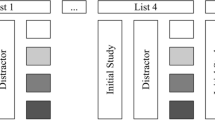Abstract
When people are asked to learn information they need to judge when they have encoded the information accurately and will be able to retrieve it correctly. Making such a judgment is an aspect of metacognitive ability, and is referred to as “recall readiness.” Previous researchers have not considered recall readiness in children with autism, therefore we asked matched groups of children with autism, children with mental retardation, and normally developing children (mean mental age: 7 years) to study several pictures of objects until they felt ready to recall all the objects without error. Their recall was then tested. The children with autism and the children with mental retardation had impaired recall readiness compared to the normally developing children. We discuss this result with reference to other research into the metacognitive abilities of children with autism.
Similar content being viewed by others
REFERENCES
Baron-Cohen, S. (1989), Are autistic children “behaviourists”? An examination of their mental-physical and appearance-reality distinctions. Journal of Autism and Developmental Disorders, 19, 579–600.
Bennetto, L., Pennington, B. F., & Rogers, S. J. (1996). Intact and impaired memory functions in autism. Child Development, 67, 1816–1835.
Brown, A. L., & Barclay, C. R. (1976). The effects of training specific mnemonics on the metamnemonic efficiency of retarded children. Child Development, 47, 71–80.
Campione, J. C. (1987). Metacognitive components of instructional research with problem learners. In F. E. Weinert & R. H. Kluwe (Eds.), Metacognition, motivation and understanding (pp. 117–140). Hillsdale, NJ: Erlbaum.
Dunn, L. M., Whetton, C., & Pintilie, D. (1982). British Picture Vocabulary Scale. London: NFER-Nelson.
Farrant, A., Boucher, J., & Blades, M. (1999). Metamemory in children with autism. Child Development, 70, 107–131.
Flavell, J. H., Friedrichs, A. G., & Hoyt, J. D. (1970). Developmental changes in memorization processes. Cognitive Psychology, 1, 324–340.
Jarrold, C., Boucher, J., & Russell, J. (1997). Language profiles in children with autism: Theoretical and methodological implications. Autism, 1, 57–76.
Kreutzer, M. A., Leonard, C., & Flavell, J. H. (1975). An interview study of children's knowledge about memory. Monographs of the Society for the Research in Child Development, 40(1, Serial No. 159).
Markman, E. M. (1973) Factors affecting the young child's ability to monitor his memory. Unpublished doctoral dissertation, University of Pennsylvania.
Minshew, N. J., & Goldstein, G. (1993). Is autism an amnesic disorder? Evidence from the California Verbal Learning Test. Neuropsychology, 7, 209–216.
Minshew, N. J., Goldstein, G., Muenz, L. R., & Payton, J. B. (1992). Neuropsychological functioning in nonmentally retarded autistic individuals. Journal of Clinical and Experimental Neuropsychology, 14, 749–761.
Minshew, N., Goldstein, G., Siegel, D. J., & Nicholson, M. (1994). Selective pattern of cognitive functioning in autism: a function of information processing load. Biological Psychiatry, 35, 632.
Murphy, M. D., Sanders, R. E., Gabriesheski, A. S., & Schmitt, F. A. (1981). Metamemory in the aged. Journal of Gerontology, 36, 185–193.
Murphy, M. D., Schmitt, F. A., Caruso, M. J., & Sanders, R. E. (1987). Metamemory in older adults: The role of monitoring in serial recall. Psychology and Aging, 4, 331–339.
Perner, J. (1991). Understanding the representational mind. Cambridge, MA: MIT Press.
Pennington, B. F., & Ozonoff, S. (1996). Executive functions and developmental psychopathology. Journal of Child Psychology and Psychiatry 37, 51–87.
Russell, J. (1996). Agency. Its role in mental development. Hove, Sussex, UK: Taylor and Francis
Russell, J., Jarrold, C., & Henry, L. (1996). Working memory in children with autism and with moderate learning difficulties. Journal of Child Psychology and Psychiatry, 37, 673–686.
Snodgrass, J. G., & Vanderwart, M. (1980). A standardized set of 260 pictures: Norms for name agreement, image agreement, familiarity and visual complexity. Journal of Experimental Psychology: Human Learning and Memory, 6, 174–215.
Wellman, H. M. (1985). The child's theory of mind: The development of conceptions of cognition. In S. R. Yussen (Ed.), The growth of reflection in children (pp. 169–206). New York: Academic Press.
Author information
Authors and Affiliations
Corresponding author
Rights and permissions
About this article
Cite this article
Farrant, A., Blades, M. & Boucher, J. Recall Readiness in Children with Autism. J Autism Dev Disord 29, 359–366 (1999). https://doi.org/10.1023/A:1023074726548
Issue Date:
DOI: https://doi.org/10.1023/A:1023074726548




